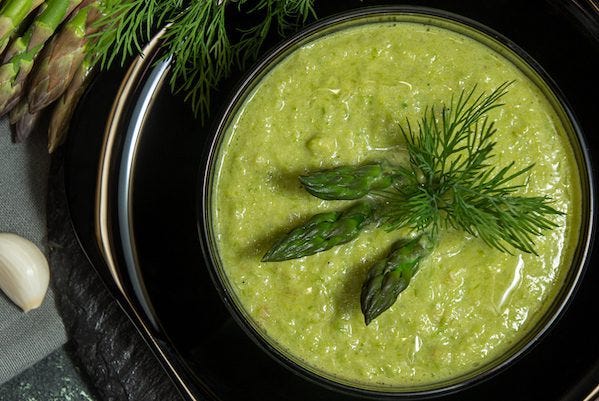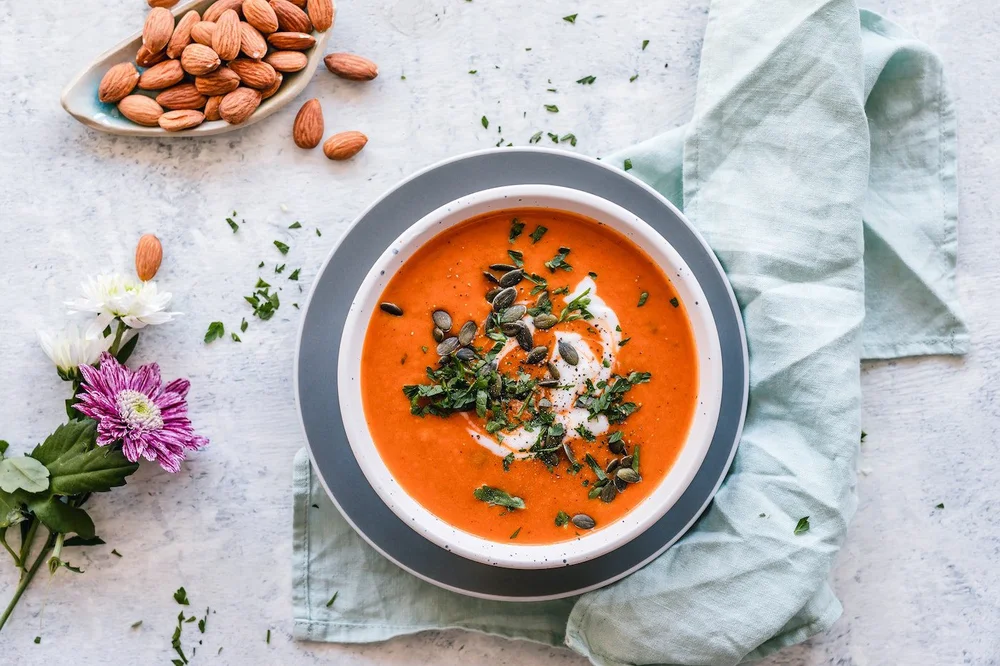Here’s How to Make Healthy & Hearty Soups (Recipes Included!)
A homemade soup’s simmering spices can fill your home with comforting aromas. A soup’s natural heartiness also can fill your body with warmth and nourishment.
Soup is good for the mind, body, and spirit.
It also can provide an incredibly healthy meal.
Research has shown that soup eaters may get high intakes of fiber, vitamin A, magnesium, iron, and potassium. They also may get more vegetables (especially dark greens and legumes) than those who don’t eat soup.
Let’s learn more about the brain-healthy, nutrient-rich vegetables, legumes, meats, fats, and grains, as well as health-promoting herbs, that you can use to make healthy soups! Here are some tips on how to make healthy soups at home:
How to Make Healthy Soups at Home
Healthy Base
When making a brain-healthy soup, it’s a good idea to bypass recipes that call for heavy cream, milk, cheese, and butter (or, if you must, use them sparingly). Instead, choose clean and healthy, plant-based milks (coconut, soy, almond, etc.) and oils such as organic virgin olive oil, avocado, or coconut oil.
These plant-based milks and fats offer brain-benefitting nutrients. For example, consuming olive oil has natural anti-inflammatory benefits and have been shown to help improve memory.
Don’t use bouillon cubes, which are loaded with MSG. Also, don’t use high-sodium beef or chicken stock. Instead, try an organic tomato base, vegetable broth, or low-sodium beef or chicken stock.
A tomato base is a great choice because lycopene, a powerful antioxidant found in tomatoes, is believed to have neuroprotective properties.
Go Green
Whatever soup you choose, add a nutritional boost of dark leafy greens and vegetables (spinach, kale, broccoli, cabbage) to it. These veggies have high vitamin and mineral content, plus antioxidants. They’re good sources of nitrates too, which, when consumed, help to relax blood vessels and allow for greater blood flow.
Asparagus is a go-to soup veggie for a reason. One of the richest vegetable sources of folate, asparagus provides great brain nutrition. Studies show that people with lower levels of folate are more likely to experience low mood and may have cognitive decline.
The truth is, most vegetables make great, nutrition-packed additions to soup. Experiment and discover which veggies you like best!
Choose Lean
Many people enjoy a hearty chicken soup, cioppino, or beef barley soup. High protein and nutrient-rich poultry, meat, and fish are true fuel for the brain, as your brain needs a steady supply of protein.
Specifically, lean protein – chicken, turkey, beef, fish, and lamb – provides essential amino acids, which are precursors for neurotransmitters (such as dopamine and serotonin) that play an important role in mental health.
Be sure to choose hormone-free, antibiotic-free, free-range, and grass-fed animal proteins.
Add Beans
Beans (also called legumes and pulses) are perfect for soup, and provide ideal nutrition for your brain. Interestingly, the word “pulse” stems from the Latin word puls, meaning seeds that can be made into a thick soup.
Legumes are naturally low in fat and cholesterol, as well as high in fiber and protein and are good sources of iron, magnesium, and folate – essential vitamins and minerals needed for a number of bodily functions. They’re also associated with increased blood flow throughout the body, which is excellent for optimal brain function.
Perhaps that’s why The Dietary Guidelines for Americans recommends adults consume 3 cups of beans per week (about a ½ cup serving a day).
Lentils and split peas are delicious soup staples. Other popular beans for soup include pinto, kidney, mung, fava, cannellini, adzuki, black-eyed peas, and black beans.
Again, mix and match and have fun creating a variety of bean soups.
Hearty Grains
Whole grains (wild/brown rice, barley, quinoa, buckwheat, millet, amaranth) and complex carbohydrates (sweet potatoes) are highly nutritious, satiating ingredients. They provide wonderful texture and heartiness to soups.
By adding whole grains, you’ll be giving your soup a dose of fiber, B vitamins, vitamin E, iron, copper, zinc, magnesium, antioxidants, and phytochemicals. They deliver steady energy to the body.
Sweet potatoes offer quick energy and are packed with nutrients. Sweet potatoes can give you a dose of vitamin A as well as anthocyanins, which may help improve brain function and offer neuroprotective effects.
Nice Spice
Fresh herbs and spices add a powerful health boost, as well as unique flavor, that can bring your soup’s ingredients together.
Cayenne pepper (and most peppers) increase blood flow, as does garlic, which is great for brain function. There are a host of spices with anti-inflammatory benefits that are associated with improved memory including curcumin, mint, ginger, sage, rosemary, and thyme.
Basil, oregano, and parsley are loaded with brain-healthy polyphenols. Cilantro appears to have neuroprotective properties as well.
These herbs add wonderful flavor when chopped fresh and sprinkled on top of a piping hot soup.
So, spice it up!
Super Healthy Soup Recipes to Try Today
Below, you’ll find two delicious, brain-healthy soup recipes to get you started. Consider making a big pot of goodness on the weekends to enjoy throughout the week, or to freeze for a quick, healthy meal at another time. Bon appétit!
Brain-Healthy Black Bean Soup

Ingredients
- 2 tbsp extra virgin olive oil
- 2 medium yellow onions, roughly chopped
- 4 large garlic cloves, crushed and peeled
- 2 carrots, peeled and roughly chopped
- 2 (15-ounce) cans black beans, drained and rinsed
- 4 cups low-sodium chicken broth (or vegetable broth for vegetarian option)
- 3/4 tsp oregano
- 1 tsp ground coriander
- 1-3/4 tsp ground cumin
- 1/8 tsp cayenne pepper
- Scant 1/2 tsp salt
- 1 tbsp fresh lime juice
- 1/3 cup sour cream (or soy-based sour cream alternative)
- Handful chopped fresh cilantro
Directions
- Heat the olive oil over medium heat in a large soup pan. Add onions, garlic cloves, and carrots and cook until onions are soft and translucent (about 7-8 minutes). Do not brown.
- Add black beans, chicken broth, oregano, coriander, cumin, cayenne pepper, and salt and bring to a boil. Reduce heat, cover, and simmer gently for around 15 min.
- Purée soup using a hand-held immersion blender until very smooth and creamy. (Alternatively, you can use a standard blender to purée the soup in batches.) Stir in lime juice and season with salt and pepper to taste. Ladle the soup into bowls and top each bowl with a dollop of sour cream and freshly chopped cilantro.
Vegan Asparagus Soup

Ingredients
- 2 tbsp virgin olive oil, or virgin coconut oil
- 1 medium onion, diced
- 4 cloves garlic, roughly chopped
- ½ cup old fashioned rolled oats
- 2 bunches of asparagus, about 2 pounds, woody ends trimmed, and stalks cut into 1-inch pieces
- 2 cups chicken or vegetable stock
- 2 cups water
- 1 large piece of lemon peel, about 2 inches
- 2 tsp sea salt
- Freshly ground black pepper to taste
Directions
- In a medium saucepan, heat the olive oil. Add the onion and sauté over medium heat until tender, about 7-8 min.
- Add the garlic and cook for 2 more min, stirring frequently.
- Add the remaining ingredients to pot. Bring soup to boil and lower to a simmer. Cover pot and cook 10-15 min until asparagus is very tender.
- Turn off heat and remove the lemon peel. Purée the soup until smooth, either directly in the pot with an immersion blender or in batches in a blender (keep the lid open a crack.)
- Garnish with steamed asparagus tips and/or chopped chives.
At BrainMD, we’re dedicated to providing the highest purity nutrients to improve your physical health and overall well-being. For more information about our full list of brain healthy supplements, please visit us at BrainMD.
- Here Are Some of the Best Tension Release Exercises to Help You Feel Your Best! - April 17, 2024
- Foodscaping: How to Grow Healthy Foods In Your Own Garden! - April 12, 2024
- Eat Your Fruits and Veggies (Don’t Drink Them) - March 29, 2024



